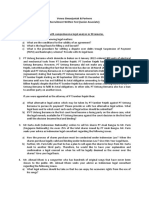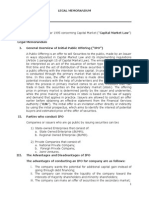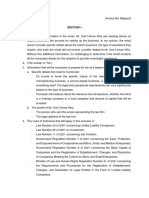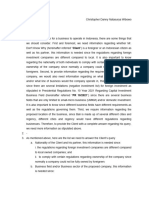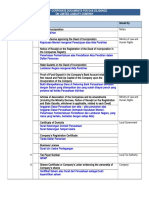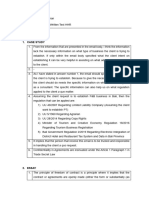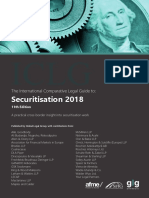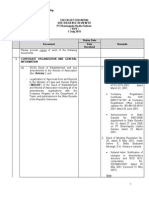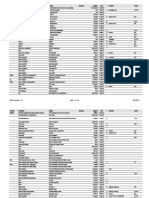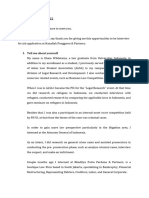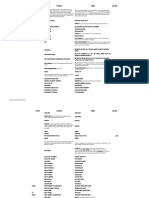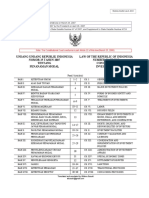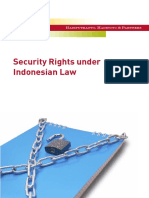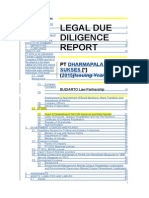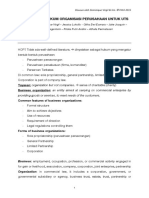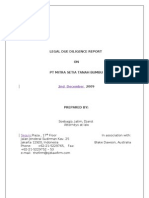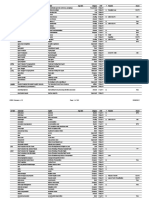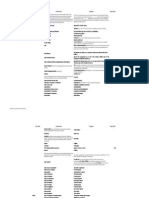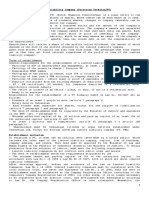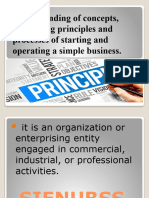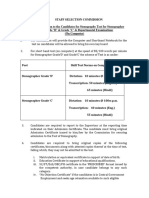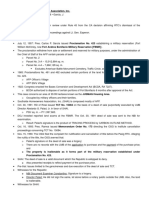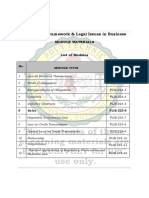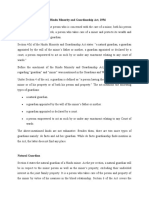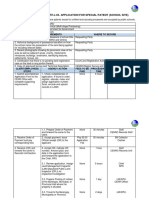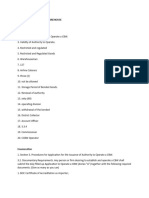Establishing A Business in Indonesia
Establishing A Business in Indonesia
Uploaded by
Geysa Pratama EriatCopyright:
Available Formats
Establishing A Business in Indonesia
Establishing A Business in Indonesia
Uploaded by
Geysa Pratama EriatOriginal Title
Copyright
Available Formats
Share this document
Did you find this document useful?
Is this content inappropriate?
Copyright:
Available Formats
Establishing A Business in Indonesia
Establishing A Business in Indonesia
Uploaded by
Geysa Pratama EriatCopyright:
Available Formats
Establishing a business in Indonesia, Practical Law Country Q&A 2-572-8259
Establishing a business in Indonesia
by Ira A Eddymurthy and Revaldi N Wirabuana, SSEK Legal Consultants
Country Q&A | Law stated as at 01-Jul-2021 | Indonesia
A Q&A guide to establishing a business in Indonesia.
This Q&A gives an overview of the key issues in establishing a business in Indonesia, including an introduction to
the legal system; the available business vehicles and their applicable formalities; corporate governance structures and
requirements; foreign investment incentives and restrictions; currency regulations; and tax and employment issues.
To compare answers across multiple jurisdictions, visit the Establishing a business in... Country Q&A Tool.
This article is part of the global guide to establishing a business worldwide. For a full list of contents, please visit
global.practicallaw.com/ebi-guide.
Legal system
Business Vehicles
Establishing a Presence from Abroad
Forming a Private Company
Financial Reporting
Trading Disclosure
Membership/shareholders
Minimum Capital Requirements
Shareholders and Voting Rights
Sectoral Restrictions
Foreign Investment Restrictions
Directors
Board Composition
Re-Registering as a Public Company
Membership
Share Capital
Tax
Non-tax Resident
Grants and tax Incentives
Employment
Proposals for Reform
© 2021 Thomson Reuters. All rights reserved. 1
Establishing a business in Indonesia, Practical Law Country Q&A 2-572-8259
Contributor profiles
Ira A Eddymurthy, Founding Partner
Revaldi N Wirabuana, Associate
Legal system
1. What is the legal system in your jurisdiction based on (for example, civil law, common law or a
mixture of both)? Does your jurisdiction operate a federal or unitary system?
Basis of Legal System
Indonesia has a civil law system.
Federal or Unitary System
Indonesia is a unitary state.
Business Vehicles
2. What are the main forms of business vehicle used in your jurisdiction? What are the advantages
and disadvantages of each vehicle?
Legal Entity
Description.
The main business vehicles in Indonesia are legal entities and business entities. In a legal entity, there is a separation
between the assets of the founder(s) and that of the established entity, which is not the case in a business entity.
Establishing a legal entity requires the approval of several government authorities, while establishing a business
entity only requires registration with government authorities.
Examples of legal entities include:
© 2021 Thomson Reuters. All rights reserved. 2
Establishing a business in Indonesia, Practical Law Country Q&A 2-572-8259
• Limited liability companies (Perseroan Terbatas (PTs)).
• Co-operatives.
• Pension funds.
Advantages/disadvantages. The main form of business vehicle used in Indonesia is the PT. A PT is a legal entity
comprised of shares that must be established by at least two shareholders. The PT is the most common form of
business vehicle because of the limited liability of shareholders and a clear capitalisation regime. A PT can be a
publicly-listed company or a privately-owned company.
A PT is generally preferred because the liability of shareholders is limited to their capital contribution. Additionally,
the boards of directors and commissioners of a PT cannot be held liable for any corporate decision adopted in good
faith, therefore providing greater protection to the parties involved.
A disadvantage of legal entities are the procedural formalities required to establish them, including but not limited
to registration with the Minister of Law and Human Rights. There also may be certain capital requirements for the
establishment of a PT.
Business Entity
Description. Business entities include civil partnerships, firms (a type of partnership), representative offices,
permanent establishments (PEs) and limited partnerships (Comanditer Venootschap (CVs)).
Advantages/disadvantages. There is typically less procedural formality involved in the establishment of a
business entity and it may also require less capitalisation than a PT. However, the founders/partners of the business
entity are personally liable for any losses suffered by the entity. Further, most foreign direct investment can only be
conducted through a PT (except for in certain sectors such as oil and gas and construction).
Establishing a Presence from Abroad
3. What are the most common options for foreign companies establishing a business presence in your
jurisdiction?
Establishing a new PT PMA
Description. The most common option for an overseas company establishing a presence in Indonesia is to set up a
limited liability company with foreign ownership (PT PMA). The first step in establishing a PT PMA is to determine
whether the PT PMA can be wholly or partially owned by foreign shareholders (see Question 20).
To establish a PT PMA, the founding shareholders or their proxies must execute a deed of establishment containing
the PT PMA's articles of association (AOA), which must be signed before a notary public and filed for approval with
© 2021 Thomson Reuters. All rights reserved. 3
Establishing a business in Indonesia, Practical Law Country Q&A 2-572-8259
the Ministry of Law and Human Rights (MOLHR) (www.kemenkumham.go.id ). The filing process at the MOLHR
is handled by the notary. Once the MOLHR approves the AOA, the PT PMA must register with the Online Single
Submission (OSS) system managed by the Capital Investment Coordinating Board (Badan Koordinasi Penanaman
Modal) (BKPM). The OSS system issues a business registration number (Nomor Induk Berusaha) (NIB) and
business licence.
For some lines of business, companies can immediately start commercial activities after obtaining the business
licence. Companies in certain business sectors (such as industry, natural resource management, or energy) must also
secure a commercial/operational licence before starting commercial activities. The commercial/operational licence
is only issued after a company has met or obtained all the standards, certificates, licences, and/or registrations
required for the product and/or service being sold.
Advantages/disadvantages. The advantages of establishing a new PT PMA are:
• Foreign investors have immediate control over the PT PMA once it is established.
• Management can be set up to suit the investors' preferences.
The disadvantages are that establishing a new PT PMA requires:
• Permits, setting up a physical presence (office) and hiring employees, which is time-consuming compared to
acquiring an existing PT PMA.
• Going through an administrative process with government institutions and agencies.
Acquiring an Existing PT PMA
Description. Another common option for an overseas company establishing a presence in Indonesia is to acquire
an existing PT PMA. Such an acquisition is also subject to MOLHR approval and OSS registration (see above,
Establishing a new PT PMA).
Advantages/disadvantages. The advantages of acquiring an existing PT PMA are:
• Pre-existing brand recognition in the market if the existing PT PMA is already widely known and in good
standing.
• The existing PT PMA already has the required licences/authorisations, an office and employees.
The disadvantages of acquiring an existing PT PMA are:
• Before acquiring an existing PT PMA, an investor should conduct legal due diligence on the PT PMA to
ascertain the soundness of the company, specifically with regard to its outstanding taxes and financial
obligations and whether the PT PMA is involved in any disputes with third parties. Legal due diligence can
incur legal costs and require time before the foreign investor can proceed to the next steps.
• Certain administrative procedures must be followed, such as notification to/registration with government
institutions and agencies.
© 2021 Thomson Reuters. All rights reserved. 4
Establishing a business in Indonesia, Practical Law Country Q&A 2-572-8259
4. How can an overseas company trade directly in your jurisdiction?
Direct Trading and Establishing a Representative Office
Description. An overseas company can trade directly in Indonesia through appointing an Indonesian agent,
distributor, or franchisee. To do so, an overseas company must enter into a distribution, agency or franchise
agreement with an existing Indonesian company. With this structure, the overseas company does not need to
establish a PT PMA (see Question 3).
An overseas company can also establish a representative office in Indonesia in the form of a:
• Foreign company representative office (Kantor Perwakilan Perusahaan Asing (KPPA)).
• Foreign trade representative office (Kantor Perwakilan Perusahaan Perdagangan Asing (KP3A)).
Licensing and other legal/regulatory requirements. KPPAs and KP3As must still be registered through the
OSS and obtain an NIB.
A KPPA engages in the provision of business services, while a KP3A engages in the trade of goods. KPPAs and KP3A
are not subject to disclosure obligations, but they are periodically required to submit activities reports to the BKPM.
KPPAs and KP3As are also subject to tax obligations under Indonesian law (for example, they must file an annual
tax report with the local tax office).
Advantages/disadvantages. The advantage of establishing a KPPA and KP3A is that investors do not have to
establish a new entity, which would be subject to minimum capital requirements. This is beneficial to investors if
the trade will be facilitated from an offshore entity. The disadvantage is that the activities of KPPAs and KP3As in
Indonesia are limited to marketing. This may not be suitable if investors intend to conduct storage or distribution
activities in Indonesia as part of their business.
5. What are the formalities for setting up a partnership?
In Indonesia, partnerships are regulated by the Civil Code and Commercial Code. There are three types of
partnership recognised in Indonesia, namely:
• Civil partnership (Maatschap or Persekutuan Perdata).
• Firms (Firma).
© 2021 Thomson Reuters. All rights reserved. 5
Establishing a business in Indonesia, Practical Law Country Q&A 2-572-8259
• Limited partnership (CV).
Set up. The establishment of a partnership does not require government approval. Foreign parties cannot establish
partnerships in Indonesia. A partnership can be established by agreement between the parties.
Applicable legislation/regulation. Indonesian Civil Code (ICC).
Partnership agreements. Under the ICC, an agreement is valid if it is consensual, entered into by legally capable
persons, concerns a certain subject matter and does not contravene public order.
Liability of partners. Under the ICC, partners in a civil partnership are personally liable for actions taken in the
interest of the partnership. A partner cannot bind other partners, unless they are properly authorised to do so. In
addition, all partners in a civil partnership are liable for any actions taken in the name of the partnership.
Assets. Partners are required to contribute capital (whether monies, assets, or services, which must be appraised
before being contributed as capital) to the partnership upon establishment. The assets of the partnership and any
profit thereof are divided in proportion to each partner’s contribution, unless agreed otherwise.
Legal personality. Under the Indonesian Commercial Code, all partners in a firm can act on behalf of the firm
and bind the firm towards any third party within the scope of the firm's purpose. All partners in the firm are jointly
liable for the actions taken by the firm.
The nature of a limited partnership is similar to that of a firm. In a limited partnership, there are partners and limited
partners. A limited partner only injects capital into the limited partnership and does not undertake any business
activity on behalf of the partnership. The Commercial Code provides that limited partners are only liable to the
extent of the amount of capital they contributed.
Taxation. Partnerships are taxed similarly to companies. This is because the Income Tax Law classifies both
partnerships and companies as business entities with the same tax rate.
6. What are the formalities for setting up a joint venture?
Structure
Joint ventures (JVs) are very common in Indonesia. There is no clear definition of JV under Indonesian law.
Generally, a JV between a foreign company and a local business involves the establishment of a PT PMA (see
Question 3).
Co-Ownership Arrangements
It is possible to agree that a JV is co-owned by multiple parties by having these parties hold equal numbers of shares
in the JV company (or PT PMA).
© 2021 Thomson Reuters. All rights reserved. 6
Establishing a business in Indonesia, Practical Law Country Q&A 2-572-8259
JVs with Unincorporated Bodies
A JV can also be unincorporated. Examples of unincorporated JVs include contractual co-operations and consortia.
However, certain business sectors in Indonesia expressly require foreign direct investment to be carried out through
a PT PMA.
JV Agreement
It is common to prepare and sign a JV agreement to protect and secure the rights and obligations of the parties to
the venture.
7. Are trusts (or a local equivalent) available in your jurisdiction?
Indonesian law does not recognise the concept of trust.
Forming a Private Company
8. How is a private limited liability company or equivalent corporate vehicle most commonly used by
foreign companies to establish a business in your jurisdiction formed?
Regulatory Framework
Limited liability companies (PTs) are governed by Law No. 40 of 2007 dated 16 August 2007 regarding Limited
Liability Companies, as amended by Law No. 11 of 2020 dated 2 November 2020 regarding Job Creation (Company
Law). Other applicable laws and regulations include:
• Law No. 25 of 2007 dated 26 April 2007 regarding Capital Investment, as amended by Law No. 11 of 2020
dated 2 November 2020 regarding Job Creation (Investment Law).
• Minister of Law and Human Rights (MOLHR) Regulation No. 21 of 2021 dated 30 April 2021 regarding
Requirement and Procedure for the Establishment, Amendment, and Dissolution of a Limited Liability
Company.
The procedure for establishing a PT PMA is governed by Chairman of BKPM Regulation No. 4 of 2021 dated 1 April
2021 regarding Guidelines and Procedures for Risk-Based Business Licensing Service and Investment Facilities.
© 2021 Thomson Reuters. All rights reserved. 7
Establishing a business in Indonesia, Practical Law Country Q&A 2-572-8259
The procedure to register a PT and obtain the necessary licences is governed by Government Regulation No. 5 of
2021 dated 2 February 2021 regarding Administration of Risk-Based Licensing.
The authorities involved in establishing a PT are the MOLHR and the BKPM. The BKPM is a regulatory body
responsible for overseeing foreign investment and the registration and licensing of PTs through the OSS system
(www.oss.go.id ).
Tailor-made or Shelf Companies
Shelf companies (understood as companies that have no activity and no assets, but are ready to be sold to another
party) are not allowed in Indonesia, especially in the context of foreign investment. The BKPM, as supervisory
authority for PT PMAs, will reject an application for a principal licence if a company cannot show that it will
implement its investment.
A PT PMA must also submit regular activities reports to the BKPM. If the PT PMA does not conduct any activity,
the BKPM can revoke the PT PMA's licence.
Formation Process
The formation process of a PT is as follows:
• Reserving the name of the PT with the MOLHR. This is usually handled by a notary. The name of the
PT must be in Indonesian. Other statutory requirements are set out in Government Regulation No. 43 of
2011 dated 4 October 2011 regarding the Procedure for the Submission and Usage of Name of PT.
• Executing and obtaining approval for the PT's AOA. Filing of the AOA with the MOHLR must be
made electronically by a notary. The notary must complete the prescribed electronic form with the required
information and supporting documents and submit them to the MOLHR at the latest 60 days after the
date of execution of the deed of establishment containing the AOA. The AOA are prepared in the form of
a notarial deed in Indonesian. The MOLHR electronically issues its signed decision to approve the PT as a
legal entity at the latest 14 days after it receives the complete application and supporting documents. The
MOLHR's approval also contains evidence of registration of the PT with the company registry maintained by
the MOLHR.
• Obtaining the PT's certificate of domicile. This is obtained from the competent local sub-district
office.
• Obtaining a taxpayer registration number (Nomor Pokok Wajib Pajak (NPWP)) and a taxable
entrepreneur registration number (PKP number). These are obtained from the competent local tax
office. Some regions in Indonesia have removed this requirement and no longer issue certificates of domicile.
• Registration of the AOA with the Ministry of Trade (MOT). Following approval of the PT's AOA by
the MOLHR, the PT must be registered in the Company Registry at the relevant MOT regional office within
three months of starting business. This process is now integrated into the OSS system and the NIB issued by
the OSS system also serves as evidence of registration with the MOT (see Question 3).
• Publication of the AOA in the State Gazette. Following MOLHR approval and MOT registration, the
AOA must be submitted to the State Printing Office for publication in the Supplement to the State Gazette.
This step is traditionally handled by a notary. The Company Law requires the MOLHR to announce the deed
© 2021 Thomson Reuters. All rights reserved. 8
Establishing a business in Indonesia, Practical Law Country Q&A 2-572-8259
of establishment of the PT along with MOLHR's approval of the deed in the Supplement to the State Gazette
within 14 days from approval.
The average timeline to establish a non-PMA PT is one month, while the establishment of a PT PMA may take six to
eight weeks. The establishment of a PT involves payment of notary fees, which vary from one notary to another.
Company Constitution
The AOA of a PT must comply with the requirements of the Company Law. While the Company Law does not provide
model AOA, it lists the minimum contents that must be incorporated in AOA. These include the:
• Name and domicile of the company.
• Purposes, objectives and business activities of the company.
• Period of incorporation of the company.
• Amount of authorised share capital, issued share capital and paid-up share capital.
• Number of shares, share classes (if any), including the number of shares in each class, rights attached to each
share, and nominal value of each share.
• Title or position and number of members of the board of directors (BOD) and board of commissioners
(BOC).
• Place and procedures for holding general meetings of shareholders (GMS).
• Procedures for the appointment, replacement and dismissal of members of the BOD and BOC.
• Procedure for the use of profits and distribution of dividends.
Financial Reporting
9.What financial or tax reports must the company submit each year?
Companies
Certain companies must submit an audited annual financial report to the Ministry of Trade (Minister of Trade
Regulation No. 25 of 2020 dated 19 March 2020 regarding Company Annual Financial Statement) if they fulfil
one or more of the following:
• Are public companies (perseroan terbuka).
© 2021 Thomson Reuters. All rights reserved. 9
Establishing a business in Indonesia, Practical Law Country Q&A 2-572-8259
• Engage in a business line that relates to the management of public funds.
• Issue debt acknowledgment letters (surat pengakuan utang).
• Have total assets or wealth of at least IDR25 billion (about USD1.7 million).
• Are debtors whose annual financial report is required by the bank to be audited.
Taxpayer companies are required to submit a Tax Notification Letter (Surat Pemberitahuan Pajak) to the
Directorate General of Taxation for the taxes for which they are liable (see Question 26). (Law No. 6 of 1983 dated
31 December 1983 regarding General Provisions and Procedures on Taxation, as last amended by Law No. 11 of
2020 dated 2 November 2020 regarding Job Creation.)
Branches of Overseas Companies
There are no financial reporting obligations for branches and representative offices (that is, KPPAs and KP3As). The
accounts of KPPAs and KP3As must comply with Indonesian law. KPPAs and KP3As must submit periodical reports
on their activities to the BKPM and an annual tax report to the local tax office.
Trading Disclosure
10. What are the statutory trading disclosure and publication requirements for private companies?
There is no legal requirement for businesses to display their names or have a sign at their premises. However,
it is common practice in Indonesia to do so for marketing and practical purposes. Under the Company Law, any
correspondence and announcements by a company must specify the name and address of the company. Every PT
must have "Perseroan Terbatas" or PT before its name. A publicly-listed company must have "Tbk" (the abbreviation
of Terbuka) after its name.
11. How do companies execute contracts or deeds?
In a PT, the BOD can sign contracts on behalf of the company. Under the Company Law, each member of the BOD
must be authorised to represent the PT, unless the AOA provide otherwise.
However, several actions of the BOD require prior approval at a GMS or by the BOC. For most company actions,
approval requirements are governed by the company's AOA. However, the Company Law specifically requires that
certain actions be approved at a GMS, including the following:
© 2021 Thomson Reuters. All rights reserved. 10
Establishing a business in Indonesia, Practical Law Country Q&A 2-572-8259
• Amendments of the company's AOA.
• Buy-back and transfer of shares.
• Increase or decrease of capital.
• Company restructuring.
• Security rights over the company's assets, if they cover more than 50% of the company's assets (in one or
more related or unrelated transactions).
Membership/shareholders
12. Are there any restrictions on the minimum and maximum number of members?
A PT must have at least two shareholders (members), under the Company Law. There are no restrictions on the
maximum number of members.
Under the Company Law, a registered PT can have a single shareholder for a period of six months, subject to meeting
certain requirements. Within this six-month period, the single shareholder must transfer a part of its shares to
another party or the company can issue new shares. A single shareholder that fails to meet this requirement is
personally liable for the agreements, undertakings and losses of the company, and any interested third party can file
a claim with the district court to dissolve the company.
Minimum Capital Requirements
13.Is there a minimum investment amount or minimum share capital requirement for company
formation?
To establish a PT with Indonesian shareholders, the minimum authorised share capital is IDR50 million (about
USD3,530) and the minimum issued share capital is IDR12.5 million (about USD890).
To establish a PT PMA, the minimum issued share capital is IDR10 billion (about USD706,000) per company. The
minimum investment is IDR10 billion (about USD706,000) in each business field, comprising minimum equity
capital of IDR2.5 billion (about USD177,000) and indicative loans.
© 2021 Thomson Reuters. All rights reserved. 11
Establishing a business in Indonesia, Practical Law Country Q&A 2-572-8259
14. Are there restrictions on the transfer of shares in private companies?
Under the Company Law, each shareholder has a pre-emptive right to subscribe to newly issued shares in proportion
to their shareholding in each class of shares. The company's AOA can:
• Give shareholders a right of first refusal to purchase certain classes of shares or all shares generally.
• Provide that a shareholder intending to sell their shares must obtain prior approval before selling.
The AOA can also set out requirements for the transfer of rights in shares, such as the obligation to obtain prior
approval from the:
• Company's organs (that is, the GMS, BOD and BOC).
• Competent authorities in accordance with applicable laws and regulations.
Shareholders and Voting Rights
15. What protections are there for minority shareholders under local law? Can additional protections
be given? Is liability limited to the value of shareholders' shares?
Protections for shareholders and/or minority shareholders are as follows (Company Law):
• A shareholder can file a claim at the district court against the company if they suffer unfair and unreasonable
losses as a consequence of resolutions of the GMS, BOD, or BOC.
• A shareholder can request the company to purchase its shares at a reasonable price if that shareholder
disapproves of the company's actions that cause losses to shareholders or the company. Such actions can
take the form of:
• amendments to the AOA;
• a transfer or pledge of the company's assets valued at more than 50% of the company's net assets; or
• a merger, consolidation or acquisition of the company.
© 2021 Thomson Reuters. All rights reserved. 12
Establishing a business in Indonesia, Practical Law Country Q&A 2-572-8259
• Shareholders representing at least one-tenth of the total shares with voting rights can file a claim with the
district court on behalf of the company against any member of the BOD and BOC who, because of his/her
mistakes or negligence, has caused losses to the company.
• One or more shareholders representing at least one-tenth of the total shares with voting rights can submit a
proposal for the dissolution of the company to the GMS.
There are no restrictions on granting additional protections to minority shareholders, but it is uncommon to grant
such additional protections.
16. Are there any statutory restrictions on quorum or voting requirements at shareholder meetings?
Must quorum or voting rights be proportionate to shareholdings?
There are statutory restrictions on the quorum of GMS. A GMS can be held and is entitled to adopt resolutions if
shareholders representing more than half of the company's shares with voting rights attend or are represented at
the meeting, unless the AOA require a higher quorum. If the quorum is not reached, a second GMS can be called and
adopt resolutions if shareholders representing not less than one-third of all shares with voting rights attend or are
represented at the meeting, unless the AOA require a higher quorum. If a quorum is not reached at the second GMS,
a request can be filed with the chairman of the competent district court to determine the quorum requirements for
a third GMS. This request must be made by the company's authorised representative as provided in the company's
AOA.
Each share grants its owner the right to attend GMS and cast one vote at GMS. Non-voting shares can be issued,
but all share classes must be entitled to dividends.
A GMS resolution must be adopted by consensus. If a consensus cannot be reached, a GMS resolution will be valid
if it is approved by more than half of the total votes cast at the GMS, unless otherwise required by the law or the
company's AOA.
17. Are specific voting majorities required by law for any corporate actions (for example, increasing
share capital, changing the company's constitution, appointing and removing directors, and so on)?
Specific majorities are required for the following corporate actions:
• Increasing and decreasing the company's authorised share capital, which must be approved by at least two-
thirds of the votes legally cast at a general meeting of shareholders (GMS) where shareholders holding at
least two-thirds of the company's total issued voting shares are present or represented.
© 2021 Thomson Reuters. All rights reserved. 13
Establishing a business in Indonesia, Practical Law Country Q&A 2-572-8259
• Amending the company's AOA (the quorum and voting requirements are the same as for an increase or
decrease of capital).
• The merger, consolidation, acquisition, winding-up, or division of the company, which must be approved by
three-quarters of the votes legally cast at a GMS where shareholders holding at least three-quarters of the
company's total issued voting shares are present or represented.
• Increasing the company's issued and paid-up share capital within the limit of authorised capital, which must
be approved by more than one-half of the total votes cast at a GMS where shareholders with more than one-
half of the total voting shares are present or represented.
The company's AOA can impose higher quorum and voting requirements to pass resolutions on these matters.
18. Can voting majorities required by law be disapplied to protect a minority shareholder (for example,
through class rights, weighted voting or super-majority veto rights)?
Voting majorities required by law cannot be disapplied to protect a minority shareholder. See Question 15 on the
protections granted to minority shareholders.
Sectoral Restrictions
19. What are the conditions or restrictions on establishing a business in specific industry sectors? Are
there industry sectors in which it is not permitted to establish a business?
Sectoral laws and regulations may impose specific requirements on establishing a business in specific sectors. A
number of sectors are only partially open to foreign investment. For example, foreign investment in liner and tramp
shipping sea transportation, postal activity, and air transportation, among other sectors, is capped at 49%.
Access to several industries is limited to local companies and partnerships between local and foreign companies,
such as the bamboo and rattan forestry business, fish hatchery, and fishery processing. There are several sectors
that are closed to both local and foreign private investment, including security, defence, and arms manufacturing.
Certain sectors are also subject to ministerial and sectoral regulations that regulate additional restrictions,
limitations, or requirements for foreign investment (see Question 21).
Foreign Investment Restrictions
© 2021 Thomson Reuters. All rights reserved. 14
Establishing a business in Indonesia, Practical Law Country Q&A 2-572-8259
20. Are there any restrictions on foreign shareholders/company members?
Restrictions on foreign shareholders are set out in Presidential Regulation No. 10 of 2021 dated 2 February 2021
regarding Capital Investment Business Lines (PR 10/2021). PR 10/2021 lists areas in which investment by both
Indonesians and foreign nationals is prohibited or restricted. In addition to PR 10/2021, the laws and regulations
governing certain lines of business must be reviewed to determine whether such lines of business are open to foreign
investment and, if so, whether a PT PMA conducting such business can be wholly foreign-owned or only partially
foreign-owned. Examples of lines of business closed to foreign investment include marijuana cultivation, marine
salvage, administration of land, passenger terminals and casinos.
Lines of business that are not listed in PR 10/2021 are open to 100% foreign investment without conditions.
PR 10/2021 also specifies foreign ownership restrictions, such as maximum foreign shareholding, requirement to
partner with a small or medium-scale enterprise, and so on. In practice, investors must still confirm with the BKPM
whether a certain line of business is open for 100% foreign investment without conditions.
The foreign investment limitations set out in the Annex of PR 10/2021 are organised by reference to the business
activities described in the Indonesian Business Fields Classification (KBLI) issued by Indonesia's Central Statistics
Body (Badan Pusat Statistik). A PT PMA can have more than one KBLI number, unless the relevant laws and
regulations provide otherwise.
21. Are there any exchange control or currency regulations? Are there any registration requirements
under anti-money laundering laws?
Exchange Control or Currency Regulations
There are no foreign exchange controls in Indonesia. The Indonesian rupiah is freely convertible into any currency
and vice versa. However, under Bank Indonesia Regulation No. 17/3/PBI/2015 dated 31 March 2015 regarding the
Mandatory Use of Rupiah within the Territory of the Republic of Indonesia (PBI 17/2015), all transactions conducted
in Indonesia must use rupiah, including payments, settlements of obligations, and other financial transactions,
whether using cash or otherwise. Exemptions are available for:
• Transactions implementing the state budget.
• Sending or receiving grants to or from abroad.
• International trade transactions.
© 2021 Thomson Reuters. All rights reserved. 15
Establishing a business in Indonesia, Practical Law Country Q&A 2-572-8259
• Bank savings accounts in foreign exchange.
• International financing transactions.
Violations of currency regulations are subject to sanctions under PBI 17/2015. Sanctions include written warnings,
fines, prohibition to take part in payment transactions, and/or up to one year's imprisonment. The authors are not
aware of the imposition of such sanctions to date.
Anti-Money Laundering laws
Money laundering is a criminal offence under Law No. 8 of 2010 dated 22 October 2010 regarding Prevention and
Eradication of Money Laundering Crimes (AML Law). Money laundering is defined in the AML Law as any of the
following actions:
• Placing, transferring, assigning, spending, paying, granting, depositing, offshoring, converting, exchanging
with foreign currency or commercial paper, or any other action upon assets that are known to be the result of
a criminal act for the purpose of hiding or obscuring the origin of such assets.
• Hiding or obscuring the true origin, source, location, purpose, assignment of rights, or ownership of an asset
that is known to be the result of a criminal act.
• Receiving or possessing the placement, transfer, payment, granting, donation, deposit, exchange, or using an
asset that is known to be the result of a criminal act.
Other Recording and Reporting Requirements
Under the AML Law, certain parties such as financial service providers and certain providers of other goods and/or
services are subject to the mandatory implementation of Know Your Customer (KYC) procedures. The providers of
other goods and/or services that are required to implement KYC are:
• Real estate companies/agents.
• Motorised vehicle traders.
• Traders of gems and jewellery/precious metals.
• Antiques and art traders.
• Auction houses.
In particular, certain financial service providers are required under sectoral regulations to have an Anti-Money
Laundering and Counter-Terrorism Financing policy in place.
Additionally, certain professionals such as lawyers, notaries, accountants, public accountants, and financial planners
are required to implement KYC procedures.
The above parties also are subject to reporting obligations to the Financial Transaction Report and Analysis Center
(Pusat Pelaporan dan Analisis Transaksi Keuangan or PPATK). The PPATK has the authority to request and obtain
© 2021 Thomson Reuters. All rights reserved. 16
Establishing a business in Indonesia, Practical Law Country Q&A 2-572-8259
data and information from government/private institutions and analyse financial transactions that could be related
to money-laundering activities.
22. Are there restrictions on foreign ownership or occupation of real estate, or on foreign guarantees
or security for ownership or occupation?
Under Law No. 5 of 1960 dated 24 September 1960 regarding Basic Agrarian Law, there are two categories of land
title comprising a total of nine rights.
The first broad category of land title encompasses five primary rights derived directly from the state:
• Right of ownership (Hak Milik).
• Right to cultivate (Hak Guna Usaha (HGU)).
• Right to build (Hak Guna Bangunan (HGB)).
• Right to use (Hak Pakai).
• Right to manage (Hak Pengelolaan).
The second broad category of land title encompasses secondary rights, which are granted by holders of primary titles
under private agreements and consist of the following:
• Right to lease.
• Right of share cropping.
• Right of land pledge.
• Right of lodging.
A secondary title is obtained based on an agreement under which a primary titleholder grants a legal interest or
secondary title to another party.
An Indonesian individual is entitled to all primary titles/rights as listed above. A limited liability company with
foreign ownership (PT PMA) is entitled to HGB and Hak Pakai titles. An individual foreign national is only entitled
to a Hak Pakai title, provided that he or she is an Indonesian resident. PT PMAs and individual foreign nationals
are entitled to secondary titles.
Directors
© 2021 Thomson Reuters. All rights reserved. 17
Establishing a business in Indonesia, Practical Law Country Q&A 2-572-8259
23. Are there any general restrictions or requirements on the appointment of directors?
Under the Company Law, individuals capable of performing legal actions can be appointed as directors, except
individuals who in the previous five years have been:
• Declared bankrupt.
• Members of a BOD or BOC found to be at fault in causing a company to be declared bankrupt.
• Sentenced for a crime that caused losses to the state or a crime related to the finance sector.
The relevant regulatory authority may impose additional requirements on the appointment of directors in specific
business sectors. Foreign nationals cannot serve as human resources directors and there are a number of other
directorship positions that foreign nationals cannot hold under the applicable employment laws and regulations.
Additionally, Minister of Manpower Decree No. 349 of 2019 dated 31 December 2019 regarding Certain Positions
that Should Not Be Held by Foreign Nationals lists certain positions that foreign nationals cannot hold in companies,
namely those related to personnel and industrial relations.
Generally, a director is not required to reside in Indonesia.
Indonesia does not recognise corporate directors.
Board Composition
24. What are the legal requirements for the composition of a company's board of directors?
Structure
Indonesia recognises a two-tier board structure. The Company Law does not regulate the structure of the BOD
or BOC, which can be determined by the company's AOA. However, the laws and regulations relating to specific
business sectors may regulate the structure of the BOD and/or BOC (for example, in the insurance and banking
sectors).
Number of Directors or Members
© 2021 Thomson Reuters. All rights reserved. 18
Establishing a business in Indonesia, Practical Law Country Q&A 2-572-8259
The Company Law does not expressly impose a minimum number of directors or commissioners, which means that
a minimum of one director and one commissioner is required. However, a company whose business is related to
the collection or management of funds from the public (such as banks and insurance companies) must have at least
two directors.
Employees' Representation
There is no requirement for employee representation on the BOD under Indonesian law.
Re-Registering as a Public Company
25. What are the requirements for a business to re-register as a public company or when does an entity
become a reporting issuer?
Membership
A public company is a company that satisfies the requirements on the minimum number of shareholders and paid-
up share capital under Law No. 8 of 1995 dated 10 November 1995 regarding Capital Markets (Capital Markets
Law), but which has not conducted a public offering. A publicly listed company is a company that has made a public
offering and is listed on the stock exchange.
The minimum number of shareholders for a public PT PMA is 300. For a PT PMA to be listed on the main board, it
must have at least 1,000 shareholders who have securities accounts at the stock exchange, as follows:
• For a company conducting an initial public offering (IPO), the total number of shareholders will be the
shareholders after the IPO.
• For a company that is already a public company, the total number of shareholders will be the shareholders
one month before the submission of the listing application.
To be listed on the development board, a PT PMA must have at least 500 shareholders who have securities accounts
at the stock exchange.
Share Capital
The minimum issued share capital for both a public company and publicly listed company is IDR3 billion (about
USD212,000). A public company listed on the main board must have at least IDR100 billion (about USD7.1 million)
of net tangible assets, while a public company listed on the development board must have at least IDR50 billion
(about USD3.53 million).
Other key Requirements
© 2021 Thomson Reuters. All rights reserved. 19
Establishing a business in Indonesia, Practical Law Country Q&A 2-572-8259
A company listed on the main board must have at least 300 million shares held by the public (free-float shares).
These must be owned by non-controlling and non-majority shareholders five days before the listing application.
Free-float shares must represent at least:
• 20% of the company's issued and paid-up share capital for companies with pre-IPO equity below IDR500
billion (about USD35.3 million).
• 15% of the company's issued and paid-up share capital for companies with pre-IPO equity between IDR500
billion and IDR2 trillion (about USD35.3 million and USD141 million).
• 10% of the company's issued and paid-up share capital for companies with pre-IPO equity exceeding IDR2
trillion (about USD141 million).
A company listed on the development board must have at least 150 million free-float shares owned by non-
controlling and non-majority shareholders five days before the listing application. The same requirements apply to
free-float shares as for listing on the main board (see above).
Tax
26. What main taxes are businesses subject to in your jurisdiction?
Income tax
Income tax is imposed on income received or obtained in one fiscal year. The corporate income tax rate is generally
22%. A 5% reduction applies to publicly listed companies that meet certain requirements.
Value Added tax (VAT)
VAT is imposed on the delivery of goods and services. The rate of VAT is 10%.
Luxury Goods Sales tax
In addition to VAT, a special tax is imposed on the import and/or delivery of luxury goods and services. Government
Regulation No. 145/2000 dated 22 December 2000 specifies the types of goods that are considered as luxury goods
and the rate of sales tax on those luxury goods. There are six types of goods subject to luxury sales tax at rates ranging
from 10% to 75%.
Land and Building tax
Land and building tax is imposed annually on property, buildings and land in Indonesia. The rate varies depending
on the location of the land or building.
© 2021 Thomson Reuters. All rights reserved. 20
Establishing a business in Indonesia, Practical Law Country Q&A 2-572-8259
Duty on Acquisition of Rights in land and Buildings (BPHTB)
BPHTB is imposed on individuals and entities that acquire rights in land and/or building. The rate of BPHTB varies
depending on the location of the land or building.
Stamp duty
Stamp duty of IDR10,000 is levied on documents that are used in court and documents that have a monetary value.
Local Government tax
Depending on an entity's domicile, various taxes, charges and duties will be imposed by the local government, such
as vehicle tax, restaurant tax, hotel tax, and so on.
27. What are the circumstances under which a business becomes liable to pay tax in your jurisdiction?
Tax Resident
A business entity is tax resident when it is established or is domiciled in Indonesia.
Non-tax Resident
A non-tax resident is:
• Any entity that is not established and has no domicile in Indonesia that carries on business or conducts
activities through a PE in Indonesia.
• Any entity that is not established and has no domicile in Indonesia that receives or earns income from
Indonesia without carrying on business or conducting activities through a PE in Indonesia.
A PE is a form of enterprise used by an individual who does not reside in Indonesia for more than 183 days in a
12-months period, or an entity that is not established or domiciled in Indonesia, to carry on business or conduct
activities in Indonesia. A PE has the same tax obligations as a tax resident. Therefore, any income generated by a
PE in Indonesia is taxable in Indonesia.
28. What is the tax position when dividends or profits are remitted abroad?
© 2021 Thomson Reuters. All rights reserved. 21
Establishing a business in Indonesia, Practical Law Country Q&A 2-572-8259
Profits or dividends that are transferred to an entity or individual abroad are subject to a 20% withholding tax. The
rate can vary depending on the applicable tax treaty (if any).
29. What thin-capitalisation rules and transfer pricing rules apply?
There are no express restrictions on loans to foreign affiliates. However, a company's debt-to-equity ratio must be
4:1 (Minister of Finance Regulation No. 169/PMK.010/2015 dated 9 September 2015 regarding the Stipulation of
Debt-to-Equity Ratio for Income Tax Purpose).
The Director General of Taxation (DGT) has issued guidelines on transfer pricing in DGT Regulation No. Per-43/
PJ/2010 dated 6 September 2010, as amended by DGT Regulation No. Per-32/PJ/2011 dated 11 November 2011
regarding the Implementation of the Arm's Length Principle in a Transaction between Taxpayers and Parties
Having a Special Relationship (DGT Reg 43/2010). Under DGT Reg 43/2010, transfer pricing is defined as the
determination of the price in transactions among parties having a special relationship. A special relationship exists
where any of the following applies:
• A taxpayer, directly or indirectly, participates in 25% or more of the capital of another taxpayer.
• A taxpayer has control over another taxpayer or two or more taxpayers are under common control, whether
directly or indirectly.
• There is a family relationship between taxpayers through blood or marriage of one degree of direct or
indirect linkage.
The DGT can adjust the amount of income and deductions and re-characterise debt as capital in related-party
transactions in accordance with the arm's length principle.
Grants and tax Incentives
30. Are grants or tax incentives available for companies establishing a business in your jurisdiction?
Tax incentives are usually available to investors engaged in any of the following activities:
• Activities that use many workers.
• Activities classified as high-priority.
© 2021 Thomson Reuters. All rights reserved. 22
Establishing a business in Indonesia, Practical Law Country Q&A 2-572-8259
• Activities classified as infrastructural development.
• Transfers of technology.
• Investment in a pioneer industry.
• Activities located in a remote area, an undeveloped area, a border area, or any another relevant area.
• Preservation of the environment.
• Research, expansion and innovation.
• Association with micro, small-scale or medium-scale businesses or co-operatives.
• Investment in an industry that uses domestic capital goods, machinery or equipment.
Tax Allowances
Tax allowances are regulated by Article 31A of Law No. 7 of 1983 dated 31 December 1983 regarding Income Tax Law,
as last amended by Law No. 11 of 2020 dated 2 November 2020 regarding Job Creation, which provides investors
with the following allowances:
• Additional net income reduction up to a maximum of 30% of the amount invested in fixed assets, including
land used for main business activities, which applies at 5% per year for six years from the commencement of
commercial production.
• Accelerated depreciation of tangible assets and accelerated amortisation of intangible assets.
• Period of loss carry-forward of between five and ten years.
• Tax on dividends at 10%, unless the applicable tax treaty provides for a lower rate.
Not all business sectors are entitled to these tax allowances. The list of business sectors and regions that can be
granted tax allowances is set out in Government Regulation No. 78 of 2019 dated 13 November 2019 regarding
Income Tax Facilities for Capital Investment in Certain Business Fields and/or in Certain Regions.
Tax Holiday
Taxpayers investing in certain pioneer industries that do not benefit from a tax allowance can be granted corporate
income tax exemption or reduction facilities, which are known as a tax holiday (Government Regulation No. 94
of 2010 dated 30 December 2010, as amended by Government Regulation No. 45 of 2019 dated 26 June 2019
regarding Calculation of Taxable Income and Redemption of Income Tax in the Current Tax Year). The reduction
can range from 10% to 100%. A must be granted for at least five years and up to ten years.
Import duty Exemptions
Exemption from import duty is available on the importation of machinery, apparatus for factory installation,
equipment or appliance, both in installed and uninstalled condition, used in industrial construction or expansion.
Exemption is available for both:
© 2021 Thomson Reuters. All rights reserved. 23
Establishing a business in Indonesia, Practical Law Country Q&A 2-572-8259
• Industrial companies producing goods.
• Service companies in the sectors of tourism and culture, public transportation, public health, mining,
construction, telecommunications, and ports.
Additionally, an exemption from import duty is available on the import of goods or materials used to produce
finished goods that are:
• Not produced in Indonesia.
• Produced in Indonesia but do not meet the required specifications.
• Produced in Indonesia but not in amount sufficient to meet industrial needs in Indonesia.
Employment
31. What are the main laws regulating employment relationships?
Employment relationships in Indonesia are governed by:
• Law No. 13 of 2003 dated 25 March 2003 regarding Manpower, as amended by Law No. 11 of 2020 dated 2
November 2020 regarding Job Creation.
• Law No. 2 of 2004 dated 14 January 2004, as amended by Government Regulation in Lieu of Law No. 1 of
2005 dated 13 January 2005 regarding Industrial Relations Dispute Settlement.
• Law No. 21 of 2000 dated 4 August 2000 regarding Labour Unions.
These laws apply to foreign employees working in Indonesia. An employment contract must be drafted in
Indonesian. If the parties execute the employment contract in Indonesian and another language, the Indonesian
version will prevail when construing the contract.
32. What prior approvals (for example, work permits, visas, and/or residency permits) do foreign
nationals require to work in your jurisdiction?
an employer that plans to employ foreign nationals must prepare a Plan for the Utilisation of Foreign Workers
(Rencana Penggunaan Tenaga Asing (RPTKA)) (Government Regulation No. 34 of 2021 dated 2 February 2021
© 2021 Thomson Reuters. All rights reserved. 24
Establishing a business in Indonesia, Practical Law Country Q&A 2-572-8259
regarding Foreign Manpower Utilization (GR 34/2021) and Minister of Manpower (MOM) Regulation No. 8 of
2021 dated 1 April 2021 regarding the Implementing Regulation of GR 34/2021 (MOM Reg 8/2021)). This RPTKA
must then be submitted to and approved by the MOM. After the RPTKA is approved, the employer must obtain
another approval from the MOM for each foreign national to be employed. This approval will be given by the MOM
in electronic form through the MOM's online system.
Foreign nationals must obtain a work visa and a residency permit. Not all work positions are open to foreign
nationals. Human resources director and other positions listed in MOM Decree No. 349 of 2019 dated 31 December
2019 regarding Positions that May Not Be Held by Foreigners are closed to foreign nationals.
Under MOM Reg 8/2021, employers must provide Indonesian language training or education for their foreign
employees, or engage an Indonesian language training institution to provide such training. This obligation is waived
for foreign nationals employed for emergency/urgent reasons, temporary employees, members of the boards of
directors, commissioners or patrons, management, and supervisors.
Proposals for Reform
33. Are there any impending developments or proposals for reform that concern any of the issues
covered in this Q&A ?
Indonesia enacted Law No. 11 of 2020 dated 2 November 2020 regarding Job Creation (Job Creation Law), which
acts as an omnibus law overhauling a significant part of Indonesia’s legal system especially in relation to the business
sector.
In 2021, Indonesia also enacted 47 Government Regulations (Peraturan Pemerintah) and four Presidential
Regulations (Peraturan Presiden) to implement the provisions of the Job Creation Law. Numerous sectoral
regulations have also been implemented as part of this overhaul.
One of the biggest changes under the Job Creation Law is the implementation of risk-based business licensing under
Government Regulation No. 5 of 2021 dated 2 February 2021 regarding the Implementation of Risk-Based Business
Licensing (GR 5/2021). GR 5/2021 categorizes business lines (as classified pursuant to the Indonesian Business Line
Classification Code (KBLI)) based on their risk. The risk level of a certain business determines the type of documents
such business must obtain before conducting business:
• High-risk businesses are required to obtain a business licence.
• Medium-risk businesses must obtain a certification of standards.
• All businesses must be registered in the OSS system and obtain an NIB.
The OSS system maintained by the BKPM will be changed in the near future to conform with the new risk-based
licensing system as set out under GR 5/2021.
© 2021 Thomson Reuters. All rights reserved. 25
Establishing a business in Indonesia, Practical Law Country Q&A 2-572-8259
Contributor profiles
Ira A Eddymurthy, Founding Partner
SSEK Indonesian Legal Consultants
T +62 21 521 2038
F +62 21 521 2039
E iraeddymurthy@ssek.com
W www.ssek.com
Professional qualifications. Indonesia, Advocate; Capital Market Legal Consultant
Areas of practice. Corporate law; mergers and acquisitions; foreign investment; banking and finance;
insurance law; tax law.
Non-professional qualifications. LL.B., University of Indonesia, 1984
Recent transactions/activities
• Assisted an investment holding group with its internal restructuring, including of its Indonesian
subsidiaries, prior to its initial public offering in Hong Kong.
• Acted for a diversified Indonesian conglomerate that operates in the property, trading and
services, manufacturing and natural resources sectors, in a transaction with a leading Singapore
holding company that focuses on real estate investments.
• Assisted a Japanese manufacturer of motorised vehicles and products in the establishment of a
joint venture with a leading Indonesian conglomerate to engage in the web portal business.
• Advised Malaysian investment holding company RII Holdings Sdn Bhd (RII) on its acquisition
of a substantial equity interest in leading Indonesian logistics company PT Pandu Siwi Sentosa
(PSS).
• Advising GlaxoSmithKline on its business operations in Indonesia.
• Lead attorney in the merger of PT Sanofi-Aventis Indonesia and PT Aventis Pharma.
• Advised on Alibaba's USD1 billion purchase of a controlling stake in online retailer Lazada.
• Acted for Pertamina, the Indonesian state-owned oil and natural gas company, in the purchase
of an additional stake in PT Trans Pacific Petrochemical Indotama, as part of PT TPPI's
restructuring.
• Advised GlaxoSmithKline on the Indonesian aspects of its global transaction with Novartis that
saw the companies complete a series of asset swaps.
© 2021 Thomson Reuters. All rights reserved. 26
Establishing a business in Indonesia, Practical Law Country Q&A 2-572-8259
• Acted for Dai-ichi Life Insurance in its USD337 million acquisition of a stake in Indonesia's PT
Panin Life, the first M&A transaction involving an Indonesian insurance company to go before
the OJK, Indonesia's financial services regulator.
• Advising on all Indonesian aspects of the USD430 million global acquisition by Enerflex of the
international contract compression, processing and after-market services business of Axip Energy
Services.
• Represented GlaxoSmithKline on a three-part deal that saw the pharmaceutical company take
full control of its Indonesian consumer healthcare business, while divesting a non-core brand and
a manufacturing facility in the country.
Languages. English, Indonesian
Professional associations/memberships. International Bar Association; Inter-Pacific Bar
Association; Indonesian Advocates Association; Indonesian Capital Market Legal Consultants
Association.
Publications
• Indonesia Omnibus Law Employment Sector Implementing Regulations – Win, Lose or Draw
for Employers?, SSEK blog, April 13, 2021 (https://www.ssek.com/blog/indonesia-omnibus-
law-employment-sector-implementing-regulations-win-lose-or-draw-for-employers)
• Indonesia’s New Investment List – Healthcare Sector, SSEK blog, March 19, 2021 (https://
www.ssek.com/blog/indonesia-s-new-investment-list-healthcare-sector)
• Indonesia Issues Regulation Clearing Way for Trading of 229 Cryptoassets, SSEK blog,
February 2, 2021 (https://www.ssek.com/blog/indonesia-issues-regulation-clearing-way-for-
trading-of-229-cryptoassets-2)
• Pharmaceutical Advertising in Indonesia (Legalease Ltd), December 2020 (https://
www.legal500.com/guides/chapter/indonesia-pharmaceutical-advertising/)
• Establishing a Business in Indonesia (Thomson Reuters Practical Law),
June 1, 2020 (https://uk.practicallaw.thomsonreuters.com/2-572-8259?
transitionType=Default&contextData=(sc.Default)&firstPage=true&bhcp=1)
• Indonesia Omnibus Law – Simplification of Business Licensing and Investment Requirements,
SSEK blog, November 17, 2020 (https://www.ssek.com/blog/indonesia-omnibus-law-
simplification-of-business-licensing-and-investment-requirements-2)
Revaldi N Wirabuana, Associate
SSEK Indonesian Legal Consultants
T +62 21 521 2038
F +62 21 521 2039
E revaldiwirabuana@ssek.com
© 2021 Thomson Reuters. All rights reserved. 27
Establishing a business in Indonesia, Practical Law Country Q&A 2-572-8259
W www.ssek.com
Areas of practice. Corporate law; foreign investment; banking and finance; shipping; real property;
data protection and privacy.
Non-professional qualifications. LLB, University of Indonesia, 2016
Recent transactions/activities
• Advised a foreign oil and gas company on LNG trade business regulations in Indonesia.
• Represented a dredging and maritime contractor company in a restructuring exercise.
• Advised a large Indonesian packaging company on an initial public offering in Hong Kong.
• Assisted a Malaysian holding company on its acquisition of a substantial equity interest in
leading Indonesian logistics company.
• Assisted a Singaporean holding company on its acquisition of an insurance brokerage company in
Indonesia.
Languages. English, Indonesian
Publications
• Indonesia’s New Data Protection Rules Move Toward Passage, SSEK blog, 4 June 2020,
(https://www.ssek.com/blog/indonesia-s-new-data-protection-rules-move-toward-passage)
• Impact of COVID-19 Pandemic on Indonesian Oil and Gas Upstream Activities, SSEK blog, 9
June 2020, (https://www.ssek.com/blog/impact-of-covid-19-pandemic-on-indonesian-oil-and-
gas-upstream-activities)
• Indonesia Omnibus Law – Changes to the Shipping Law Hint at Smoother Sailing for Business,
SSEK blog, 23 November 2020 (https://www.ssek.com/blog/indonesia-omnibus-law-changes-
to-the-shipping-law-hint-at-smoother-sailing-for-business).
END OF DOCUMENT
Related Content
Topics
Cross-border - Company Law and Corporate Governance
Practice note: overview
A toolkit for forming a limited company • Maintained
A guide to Practical Law's UK corporate governance materials • Maintained
Practice notes
Forming and Organizing an LLC (DE) • Maintained
© 2021 Thomson Reuters. All rights reserved. 28
Establishing a business in Indonesia, Practical Law Country Q&A 2-572-8259
Checklists
Corporate governance codes in EU jurisdictions • Law stated as at 26-Jun-2019
Country Q&A
Corporate Governance and Directors' Duties in Indonesia: Overview • Law stated as at 01-Sep-2021
Tax on Corporate Lending and Bond Issues in Indonesia: Overview • Law stated as at 01-Aug-2021
Doing business in Indonesia: overview • Law stated as at 01-Mar-2020
Toolkit
Corporate Formation and Housekeeping Toolkit • Maintained
© 2021 Thomson Reuters. All rights reserved. 29
You might also like
- Indonesia Due Diligence Checklist Short Form 2013Document5 pagesIndonesia Due Diligence Checklist Short Form 2013Nindy Ratri KNo ratings yet
- Legal Test - AssociateDocument2 pagesLegal Test - AssociateArsael SianturiNo ratings yet
- Corporate LawDocument26 pagesCorporate Lawmaic100% (3)
- LDDDocument28 pagesLDDrendyNo ratings yet
- 06.LP - CC.LDD.01 CHJRED - Draft Legal Due Diligence ReportDocument47 pages06.LP - CC.LDD.01 CHJRED - Draft Legal Due Diligence Reportgilang pratamaNo ratings yet
- Soal Test Corporate Law Firm Di JakartaDocument5 pagesSoal Test Corporate Law Firm Di Jakartafahmi putra MartinNo ratings yet
- Written Test VSP Lawfirm - Junior AssociateDocument2 pagesWritten Test VSP Lawfirm - Junior AssociateHizkia TrifirmantoNo ratings yet
- Legal Memorandum Initial Public OfferingDocument6 pagesLegal Memorandum Initial Public OfferingMarisa U. TambunanNo ratings yet
- Soal Test Corporate Law FirmDocument7 pagesSoal Test Corporate Law FirmAldi OutsiderNo ratings yet
- AKSARA NUSANTARA - Shareholders' AgreementDocument43 pagesAKSARA NUSANTARA - Shareholders' AgreementHasfi YakobNo ratings yet
- The 5 Ws and 1 H Ofpolice ReportsDocument3 pagesThe 5 Ws and 1 H Ofpolice ReportsJireh Lumayno83% (6)
- Business Law - Mid TestDocument18 pagesBusiness Law - Mid TestAnnisaNo ratings yet
- Written Test Answer - Annisa Nur Wijayanti - Annisa Nur WijayantiDocument8 pagesWritten Test Answer - Annisa Nur Wijayanti - Annisa Nur WijayantiIqbal Farisi HattaNo ratings yet
- Set Up A Company in IndonesiaDocument5 pagesSet Up A Company in IndonesiaOtniel BeltazarNo ratings yet
- Written Test Answer - Luthfi Aulia Himawan - Luthfi Aulia HimawanDocument2 pagesWritten Test Answer - Luthfi Aulia Himawan - Luthfi Aulia HimawanIqbal Farisi HattaNo ratings yet
- Written Test Answers - Muhammad Hilman Bagaskara - Muhammad Hilman BagaskaraDocument14 pagesWritten Test Answers - Muhammad Hilman Bagaskara - Muhammad Hilman BagaskaraIqbal Farisi HattaNo ratings yet
- Written Test Anwsers - Christopher Danny - Christopher Danny NatasuryaDocument11 pagesWritten Test Anwsers - Christopher Danny - Christopher Danny NatasuryaIqbal Farisi HattaNo ratings yet
- Soal LawyerDocument4 pagesSoal LawyerRonal ParhusipNo ratings yet
- Nurjadin Sumono Mulyadi & Partners - SelectionDocument3 pagesNurjadin Sumono Mulyadi & Partners - SelectionFachry BustomiNo ratings yet
- List of LDD Corporate Documents For PTDocument2 pagesList of LDD Corporate Documents For PTMirza AlexanderNo ratings yet
- Written Test Answer - Abdurrahman - Abdu RahmanDocument6 pagesWritten Test Answer - Abdurrahman - Abdu RahmanIqbal Farisi HattaNo ratings yet
- Securitisation 2018 - ABNRDocument14 pagesSecuritisation 2018 - ABNRrillaraishaNo ratings yet
- AO A Career in Law JakartaDocument40 pagesAO A Career in Law JakartaAbdullahNo ratings yet
- Ginting and ReksodiputroDocument12 pagesGinting and ReksodiputroOsdi AlampratamaNo ratings yet
- Shareholders Agreement Finish (Mirza Hafez)Document26 pagesShareholders Agreement Finish (Mirza Hafez)JonDissectionNo ratings yet
- Hukumonline - Workshop Joint Venture Agreement 1Document14 pagesHukumonline - Workshop Joint Venture Agreement 1Jody Adiguna MicahNo ratings yet
- DUS LDD Checklist UpdatedDocument38 pagesDUS LDD Checklist UpdatedHubertus SetiawanNo ratings yet
- BR HHP IndonesiasnewcompanylawDocument21 pagesBR HHP IndonesiasnewcompanylawWidya NasevaNo ratings yet
- Example Legal Due Diligence Report RedactedDocument19 pagesExample Legal Due Diligence Report RedactedIman Putra UtamaNo ratings yet
- SSEK Glossary v.1.2 12/07/2021: Page 1 of 155Document155 pagesSSEK Glossary v.1.2 12/07/2021: Page 1 of 155Sabrina FauzanazilaNo ratings yet
- Complete Procedures Establishing PT PMADocument9 pagesComplete Procedures Establishing PT PMASoraya KishNo ratings yet
- HPRP InterviewDocument5 pagesHPRP InterviewIlham WildatamaNo ratings yet
- AKSARA NUSANTARA - Term SheetDocument15 pagesAKSARA NUSANTARA - Term SheetHasfi YakobNo ratings yet
- LDD PT OlamDocument65 pagesLDD PT OlamHubertus SetiawanNo ratings yet
- GlossaryDocument340 pagesGlossaryAjiAgungNugrohoNo ratings yet
- Soal Test Corporate Law FirmDocument4 pagesSoal Test Corporate Law FirmMerin Zuldani AlamNo ratings yet
- LDD Request List - USDocument16 pagesLDD Request List - USTubagus Syaqief HarizansyahNo ratings yet
- Law No. 25 of 2007 Investments Indonesia (Wishnu Basuki)Document38 pagesLaw No. 25 of 2007 Investments Indonesia (Wishnu Basuki)Wishnu Basuki100% (3)
- BR HHP Securityrightsindonesianlaw May15Document13 pagesBR HHP Securityrightsindonesianlaw May15Randy PongtikuNo ratings yet
- Compro Ine DiniDocument10 pagesCompro Ine DiniNugi TanzilNo ratings yet
- Joint Ventures in Indonesia 195Document8 pagesJoint Ventures in Indonesia 195Dewa Gede Praharyan JayadiputraNo ratings yet
- Summary of Legal Due Diligence Result: Rangkuman Hasil Penelitian HukumDocument2 pagesSummary of Legal Due Diligence Result: Rangkuman Hasil Penelitian HukumErni0684No ratings yet
- Written Test - Paralegal - Section 1Document3 pagesWritten Test - Paralegal - Section 1rmuhammadraaiNo ratings yet
- LDD PT DusDocument70 pagesLDD PT DusHubertus Setiawan100% (1)
- Hop - UtsDocument21 pagesHop - UtsGrafita DyahNo ratings yet
- AKTA MERGER (FINAL) - MND 05 07 2020 FNLDocument19 pagesAKTA MERGER (FINAL) - MND 05 07 2020 FNLNicoleNo ratings yet
- Backdoor ListingsDocument3 pagesBackdoor ListingsIndra PutraNo ratings yet
- Company Profile 2017Document40 pagesCompany Profile 2017Kenan A. DwianggaNo ratings yet
- ABNR-Guide To Doing Business in Indonesia 9Document58 pagesABNR-Guide To Doing Business in Indonesia 9Marisah Ulfah100% (1)
- Soal Tes Tertulis DKMS LawyersDocument2 pagesSoal Tes Tertulis DKMS LawyersFerlianto Dwi PutraNo ratings yet
- LDD - PT - Mitra - Setia - Tanah - Bumbu dtd.021209Document40 pagesLDD - PT - Mitra - Setia - Tanah - Bumbu dtd.021209Emily Mitchell100% (2)
- Joint Venture AgreementDocument7 pagesJoint Venture AgreementFirman HamdanNo ratings yet
- Firm Profile Masena Benhard AdvocatesDocument7 pagesFirm Profile Masena Benhard Advocatesb4g6yNo ratings yet
- Legal Due Diligence Checklist For Joint Venture CompanyDocument1 pageLegal Due Diligence Checklist For Joint Venture Companygatirahmanah100% (1)
- Glossary of Law 1Document162 pagesGlossary of Law 1rama12388100% (1)
- Sample LDD Report 1 (1) - 1Document104 pagesSample LDD Report 1 (1) - 1vina puspitasariNo ratings yet
- Glossary Istilah Dalam Dokumen HukumDocument327 pagesGlossary Istilah Dalam Dokumen HukumMohamad Gilang75% (4)
- Limited Liability C Ompany (Perseroan Terbatas/PT)Document8 pagesLimited Liability C Ompany (Perseroan Terbatas/PT)Sergyo SihombingNo ratings yet
- (Master File) CSPA TemplateDocument30 pages(Master File) CSPA TemplateHeru PradanaNo ratings yet
- Establishing A Business in Indonesia - Practical LawDocument44 pagesEstablishing A Business in Indonesia - Practical LawmirenNo ratings yet
- Qtr4 Week1 LessonDocument21 pagesQtr4 Week1 LessonSean Calvin ParasNo ratings yet
- Swim Waver FormDocument2 pagesSwim Waver FormSelva NarayNo ratings yet
- Instruction To The Candidates For Stenography Test For StenographerDocument3 pagesInstruction To The Candidates For Stenography Test For StenographerHamayani DragonNo ratings yet
- Lorenzo Shipping v. NPCDocument1 pageLorenzo Shipping v. NPCJayson RacalNo ratings yet
- Gov Uscourts Paed 586669 1 0Document38 pagesGov Uscourts Paed 586669 1 0ForkLogNo ratings yet
- Oracle ARDocument6 pagesOracle ARMr. JalilNo ratings yet
- Equinix Consent FormDocument4 pagesEquinix Consent Formlazars25No ratings yet
- Re - Column of Ramon Tulfo A.M. No. 92-7-360-0Document2 pagesRe - Column of Ramon Tulfo A.M. No. 92-7-360-0Gi Li100% (1)
- Republic Vs ShaiDocument3 pagesRepublic Vs ShaiCeline InterinoNo ratings yet
- Application For Survivors Benefits Pension/Provident FundDocument9 pagesApplication For Survivors Benefits Pension/Provident FundXANPHOXYL KIBETNo ratings yet
- BSEDC Programmer 2023Document4 pagesBSEDC Programmer 2023Himanshu 410No ratings yet
- Regulatory Framework & Legal Issues in Business: Module MaterialsDocument7 pagesRegulatory Framework & Legal Issues in Business: Module MaterialsKaiNo ratings yet
- Award 39474Document18 pagesAward 39474adibanuar7No ratings yet
- Types of Guardians Under Hindu LawDocument4 pagesTypes of Guardians Under Hindu LawNithiNo ratings yet
- Whole Course NotesDocument81 pagesWhole Course NotesScribd UserNo ratings yet
- Contract of EmploymentDocument5 pagesContract of EmploymentMaya Ramos100% (1)
- NON Disclosure AgreementDocument3 pagesNON Disclosure Agreementdesire4mayankNo ratings yet
- 4-Kurs Til Tarixi MajmuaDocument251 pages4-Kurs Til Tarixi MajmuaAntares CoboderoNo ratings yet
- CASE DIGEST - Reed Vs ReedDocument2 pagesCASE DIGEST - Reed Vs ReedKent-Kent VillaceranNo ratings yet
- Application For Special Patent School SiteDocument5 pagesApplication For Special Patent School SiteChea MasangkayNo ratings yet
- Maxlifestyle BrochureDocument2 pagesMaxlifestyle Brochuregopinathdxb5No ratings yet
- Planas v. COMELEC Case Digest PDFDocument4 pagesPlanas v. COMELEC Case Digest PDFLawiswisNo ratings yet
- Indian Bank v. Maharashtra State Coop. Marketing Federation, AIR 1998 SC 1952 Trikamda Jethabhai v. Jivraj Kalianji AIR 1942 Bombay, 314 Code of Civil Procedure, 1908 S 10Document3 pagesIndian Bank v. Maharashtra State Coop. Marketing Federation, AIR 1998 SC 1952 Trikamda Jethabhai v. Jivraj Kalianji AIR 1942 Bombay, 314 Code of Civil Procedure, 1908 S 10Aaryana AnandNo ratings yet
- ANS KEY of CUSTOM WAREHOUSEDocument3 pagesANS KEY of CUSTOM WAREHOUSEjohn christopher rectoNo ratings yet
- NEGOTIABLE INSTRUMENTS - ExamsDocument2 pagesNEGOTIABLE INSTRUMENTS - Examsjan bertNo ratings yet
- NDS 2015 Supplement Table 1B - S4S Section PropertiesDocument1 pageNDS 2015 Supplement Table 1B - S4S Section PropertiesTariqul IslamNo ratings yet
- 14B PGL-1Document18 pages14B PGL-15h9fcn8jfjNo ratings yet
- Rodriguez vs. COMELEC GR 120099 1996 DigestDocument2 pagesRodriguez vs. COMELEC GR 120099 1996 DigestJamiah Obillo HulipasNo ratings yet
- People vs. Dela Rosa, 849 SCRA 146, G.R. No. 230228 December 13, 2017Document32 pagesPeople vs. Dela Rosa, 849 SCRA 146, G.R. No. 230228 December 13, 2017Elaine GuayNo ratings yet
- Article 14-Principles of Dalmia CaseDocument2 pagesArticle 14-Principles of Dalmia CaseHrishika NetamNo ratings yet






